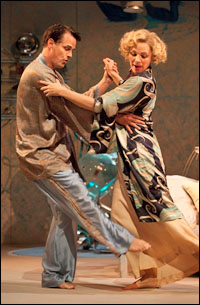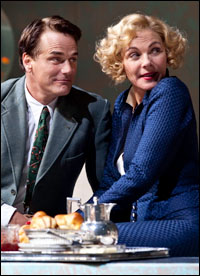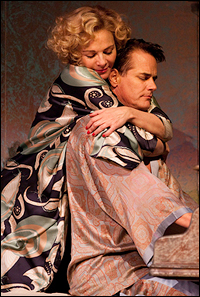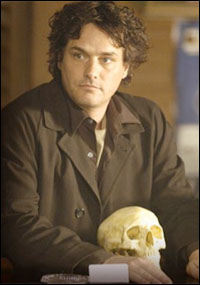
*
He's opposite the Amanda of Kim Cattrall, having joined the Richard Eyre-directed production for its North American life (Toronto, and now Broadway's Music Box) following a London run in 2010, where Matthew Macfadyen played one half of a divorced couple who meet on adjoining balconies while on fresh honeymoons with new spouses. Noel Coward's sophisticated 1930 light comedy with dark patches stretches new muscles for the actor who also starred as a Canadian Mountie in the TV series "Due South" and as the Devil in TV's short-lived "Eastwick." But after playing Hamlet at the Stratford Shakespeare Festival, can Coward really be a workout?
One of the strengths of Private Lives is that you keep wondering if Amanda and Elyot will be together in the end. I've seen the play many times, but it always keeps me guessing.
Paul Gross: It's quite brilliantly constructed, isn't it? I think it's one of those plays — the more you do it, the more I start to think there's almost nothing in here I think isn't absolutely on-the-nose and kind of perfect.
Have you done Coward before?
PG: No, I never have. I never had any particular feeling for him one way or the other. I've seen various productions, and I'd seen a production of Private Lives a number of years ago and I liked it — it was very funny — but it didn't kind of mean anything to me. But it was really in longer conversations with Richard Eyre, initially, that he persuaded me to go and read it again, as if I didn't know anything about Coward. I think he's one of those playwrights that had a kind of — there was a style that accompanied all of his productions — in the way that, for a period of time, there was a "style" of Chekhov. You had to go through that [period] until you got other people or new people looking at it and thinking, "Wait a minute, there's more going on in this play than perhaps we thought."
It's not all rolling R's.
PG: Correct, yes. [Laughs.] And, they're not only in tuxedos. There's blood pumping underneath.
PG: Yeah. It's kind of a funny balance. The nature of the play is such that you can kind of drift into broader, coarser farce, and because he's pound-for-pound, unbelievably f--king funny, you can stand every line to get a reaction. But we found that one of the key things is…you have to step on certain laughs to try to get to the point of the section. And, of course, an audience howling at material is like crack cocaine for actors —they just can't not lean into it.
| |
 |
|
| Gross and Kim Cattrall in Private Lives. | ||
| photo by Cylla von Tiedemann |
PG: Well, I don't think anything is analogous to Hamlet, that's just a preposterous amount of…
Text?
PG: Really, it's sort of aversion therapy. [Laughs.] Hamlet is awful, but there are elements of [Private Lives] that are like that. I think one of the things that has been interesting to do with Coward is actually the speed of it. There's something about the nature of the tune of his writing. When you're in it, inside his rhythm, it's quite effortless, to some extent, and when you're outside of his rhythm, it's just really hard. The whole thing starts to fall down a little bit around you. The [characters'] brains move extremely quickly. I would say, collectively, this cast's brain is not as fast as he is. [Laughs.] That's been a lot of the work, getting it up to speed.
One of the great things about the balcony sequence is that it isn't as brisk as what comes later in the play. Coward was smart. He knew that these were kind of sad people who were connected to the wrong people, and he let sadness and meditation exist in Amanda and Elyot's Act One reunion. It builds from there, is what I'm saying.
PG: Yeah, and it builds sort of beautifully. Everything has this silhouette of the British-upper-class-1930-between-the-wars. What I like about, not only his writing, but what Richard has done with the production, is that all of that [British reserve and sophistication] suddenly [falls apart] — like the studs pop off of the tuxedo shirts, and the wigs go slightly askew and [laughs] everything starts to become unglued until you get to the end of this insane tea party scene. It's so bizarre. They're all completely nuts.
After all the chaos of Act Two, they all must fight to get back to British civility, over tea. It's in their DNA.
PG: Yeah.
Are you a researcher or are you a text guy? Did you read Coward's letters and notes about the play?
PG: Yeah, I read some of it. His diary is really interesting to read. It's ginormous — I didn't get through all of it. Most of [my preparation] was talking to Richard. I find, sometimes, research is really useful. I also knew a fair bit about the period between the wars to start with, but to some degree, of course, you're going into a production which has already been done in London. I was replacing Matty Macfadyen. I think my research was more talking to the knight of the realm, trying to figure out what it was he was after. But, yeah, I probably spend more time on the text than I would on reading about the period and so on, but I was actually very interested in that money class. Obviously, [Amanda and Elyot] weren't too concerned about running off to get to the office. [Laughs.] "I went and traveled around the world after we broke up." "Oh, I guess you have bags of money." [Laughs.]
| |
 |
|
| Gross and Kim Cattrall in Private Lives. | ||
| photo by Cylla von Tiedemann |
PG: Well, yeah, I actually gave some thought [to that]. A little bit of that is built in Simon [Paisley Day]'s character Victor: He has that shell-shocky thing when things start going awry in the third act. Talking to Richard, I think they all had served — virtually all of them, one way or another. And, I think that Elyot probably served as an officer, perhaps not a front-line guy, but I think certainly he would've served, and I think that it was a whole generation scarred by that war. And, for me, I think it somewhat accounts for his anarchy, that kind of essential anarchy that he has.
Actually, there's a section in there where Elyot is talking and I think that's quite probably the distillation of [his world view]. She says, "I think you're just talking nonsense to me." He says, "Well so is everyone else in the long run." Let's be superficial, let's pity philosophers, let's just enjoy the party because we don't know what's coming after this. Let's have fun. I think that that's an attitude that probably was really produced by the carnage of the First World War.
These are people who clearly don't believe in Heaven or Hell or God, but in each other. You have to find faith in earthly pleasure.
PG: Yeah, I think so. Again, not to go too deeply into it, but I think that was the big clearinghouse of the crucible of the first war. It did kind of knock Orthodox religion off its perch altogether for a very long time; everything that we held up to that point fell to pieces in the face of that kind of devastation. These are definitely people who only believe in the temporal and…in one another and the power of things like love… These people really shouldn't be together, but, of course, they have to be together.
| |
 |
|
| Cattrall and Gross in Private Lives. | ||
| photo by Cylla von Tiedemann |
PG: "There isn't a particle of you I don't know, remember and want."
That's gorgeous.
PG: Yeah. I think [Coward] was such a stunning observer of sexual attraction and of heterosexual relationships, too. Obviously, he's slightly outside of that. Some of this relationship is based on a couple that he knew quite well, and I think he was an astoundingly acute observer of all of that. Are you noticing that audiences are different here than in Toronto?
PG: Slightly, but I really wouldn't know how to characterize it. I think that's part of us just getting used to the theatre because it's quite a bit more intimate than what we were playing — I love [the Music Box], by the way. Oh my God, that's a great stage. It feels like we were playing bigger in Toronto because it's quite a big house, so the adjustment has been to bring it back down to fit that space. The first audience [on Broadway], although they were very nice, I think we didn't really know how to manage them. It was a bit like surfing and falling a lot. There's a silly exchange where Sybil says, "Where are you going?" and I say, "Canada!" And, of course, in Canada we got this ridiculously huge response, and I thought, "Well, that's not going to happen at all here." Well, we're actually getting the same kind of response. [Laughs.] I don't know if it's filled with Canadians or maybe it's just funny on its own. I'm not sure. I'm assuming it's for slightly different reasons. Sadly, in Canada, the huge ovation was, "Oh, good! Our country was named in a play." Here, I think it's just, "That's a very funny idea." [Laughs.]
| |
 |
|
| Gross in "Slings & Arrows" |
PG: Yeah. The last play I did was ten years ago, and it was Hamlet.
Why so long?
PG: Oh, I just got wrapped up in doing other things — television and film things. It wasn't really intentional, it just kind of fell out that way. So, I was really thrilled when this came along because it kind of fit. I, more or less, had a hole in my schedule and I thought, "Oh, perfect."
"Slings & Arrows" is one of my favorite, favorite, favorite TV experiences ever.
PG: Oh, that's so great to hear. That show is so strange. The old-style viral nature of [its popularity] — that everybody is passing discs around. The first conversation I had with Richard Eyre was about the show. That's what we starting bonding about, "Slings & Arrows." He was crazy about it. When we were making it — the first [season] anyway — nobody really had any sense whether or not it would ever get done because we did it on about eight dollars and it was very quick. But also we wondered if there was any audience out there for it.
It also occurs to me that Geoffrey, your director character in "Slings & Arrows," and Ellen, the actress and love interest [played by Gross' real-life wife Martha Burns], are very much like Elyot and Amanda. Was there discussion about that? Did co-creator Bob Martin talk about it?
PG: No, you know, I don't know if Bob and Mark [McKinney] and Susan [Coyne] ever talked about it. It never came up in conversations with me. But, certainly, when I first read Private Lives and I was trying to decide whether I was going to do it, I was talking with Martha. I said, "This is exactly like our characters from 'Slings & Arrows.'"
Is there any talk about a season four? Or was a three-act form a perfect form?
PG: Well, I think there's always discussion about it, but I wasn't one of the producers. I was just an actor on it and I don't know. I think it would be lovely to do another one. There has been some conversation; I know that's been going on, about doing this sort of prequel to it — the formation of the theatre, but I'm not sure where that's gotten to. I'm embarrassed to say that I didn't know until just now that Martha Burns was your wife. No wonder there was chemistry on "Slings & Arrows."
PG: Well, we never seemed to have worked that much together, and I think we were both slightly leery about doing "Slings & Arrows" together. We talked about it — "Do you think we'll be okay? Will we hate each other?" And, it actually turned out to just be wonderful. We had lots of fun.
(Kenneth Jones is managing editor of Playbill.com. Follow him on Twitter @PlaybillKenneth.)
View highlights from the show:










